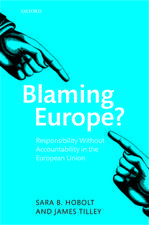The European Council and European Governance: The Commanding Heights of the EU: Routledge Studies on Government and the European Union
Editat de François Foret, Yann-Sven Rittelmeyeren Limba Engleză Paperback – 12 oct 2015
Reform of institutions and the creation of new political functions at the top of the European Union have raised fresh questions about leadership and accountability. This book argues that the European Union exhibits a political order with hierarchies, mechanisms of domination and legitimating narratives. As such, it can be understood by analysing what happens at its summit. Taking the European Council as the nexus of European political governance, contributors consider council and rotating presidencies' co-operation, rivalry and opposition. The book combines approaches through events, processes and political structures, issues and the biographical trajectories of actors and explores how the founding compromise of European integration between sovereignty and supranationality is affected by the evolving nature of this new European political model which aims to combine cooperation and integration.
The European Council and European Governance will be of strong interest to students and scholars of European studies, political science, political sociology, public policy and international relations.
| Toate formatele și edițiile | Preț | Express |
|---|---|---|
| Paperback (1) | 462.43 lei 6-8 săpt. | |
| Taylor & Francis – 12 oct 2015 | 462.43 lei 6-8 săpt. | |
| Hardback (1) | 1053.95 lei 6-8 săpt. | |
| Taylor & Francis – 13 noi 2013 | 1053.95 lei 6-8 săpt. |
Din seria Routledge Studies on Government and the European Union
-
 Preț: 326.49 lei
Preț: 326.49 lei -
 Preț: 290.42 lei
Preț: 290.42 lei -
 Preț: 416.22 lei
Preț: 416.22 lei -
 Preț: 414.32 lei
Preț: 414.32 lei -
 Preț: 405.66 lei
Preț: 405.66 lei - 13%
 Preț: 297.57 lei
Preț: 297.57 lei -
 Preț: 416.22 lei
Preț: 416.22 lei -
 Preț: 389.38 lei
Preț: 389.38 lei - 18%
 Preț: 126.62 lei
Preț: 126.62 lei -
 Preț: 382.95 lei
Preț: 382.95 lei - 18%
 Preț: 1000.27 lei
Preț: 1000.27 lei - 16%
 Preț: 273.05 lei
Preț: 273.05 lei -
 Preț: 383.93 lei
Preț: 383.93 lei -
 Preț: 396.73 lei
Preț: 396.73 lei -
 Preț: 415.24 lei
Preț: 415.24 lei - 17%
 Preț: 256.85 lei
Preț: 256.85 lei - 18%
 Preț: 949.47 lei
Preț: 949.47 lei - 9%
 Preț: 936.17 lei
Preț: 936.17 lei
Preț: 462.43 lei
Nou
Puncte Express: 694
Preț estimativ în valută:
88.50€ • 92.05$ • 73.06£
88.50€ • 92.05$ • 73.06£
Carte tipărită la comandă
Livrare economică 14-28 aprilie
Preluare comenzi: 021 569.72.76
Specificații
ISBN-13: 9781138187542
ISBN-10: 1138187542
Pagini: 210
Ilustrații: 10 black & white illustrations, 4 black & white tables, 3 black & white halftones, 7 black & white line drawings
Dimensiuni: 156 x 234 x 11 mm
Greutate: 0.29 kg
Ediția:1
Editura: Taylor & Francis
Colecția Routledge
Seria Routledge Studies on Government and the European Union
Locul publicării:Oxford, United Kingdom
ISBN-10: 1138187542
Pagini: 210
Ilustrații: 10 black & white illustrations, 4 black & white tables, 3 black & white halftones, 7 black & white line drawings
Dimensiuni: 156 x 234 x 11 mm
Greutate: 0.29 kg
Ediția:1
Editura: Taylor & Francis
Colecția Routledge
Seria Routledge Studies on Government and the European Union
Locul publicării:Oxford, United Kingdom
Public țintă
Postgraduate and UndergraduateCuprins
1. Introduction François Foret and Yann-Sven Rittelmeyer PART I: The European Council as an institution and a policy-maker 2. The Institutional Consecration of the European Council: Symbolism beyond Formal TextsYann-Sven Rittelmeyer 3. More than a Prestigious Spokesperson – the Role of Summits and the European Council in European Political Co-operation (EPC), 1969–1981 Emmanuel Mourlon-Druol 4. EU High Politics – the Policy Agenda of the European Council, 1975–2011 Petya Alexandrova, Marcello Carammia and Arco Timmermans PART II: The EU Presidency and the European Council – complementary or competitive? 5. What's Left of the Rotating Presidency? The Future of ‘National’ PresidenciesSimone Bunse and Christopher Klein 6. The Communautarization of the Council Presidency – Intra-institutional Dimensions and Inter-institutional Effect Ana Mar Fernández Pasarín 7. The Council Presidency and the European Council – Towards Collective Leadership in the EU Steven Van Hecke and Peter Bursens PART III: Legitimization of the European Union 8. An Expectation–Outcome Gap Writ Large – the Felipe González Reflection Group Revisited Lars Hoffman and Hartmut Mayer 9. Legitimacy in Numbers? Communicative Aspects of the Post-Lisbon EU François Foret 10. Problems of Compound Representation in the European Union after Lisbon Christopher Lord
Descriere
In recent years, the failure of the constitutional process, the difficult ratification and implementation of the Lisbon Treaty, as well as the several crises affecting Europe have revitalized the debate on the nature of the European polity and the balance of powers in Brussels. This book explains the redistribution of power in the post-Lisbon EU with a focus on the European Council.
















